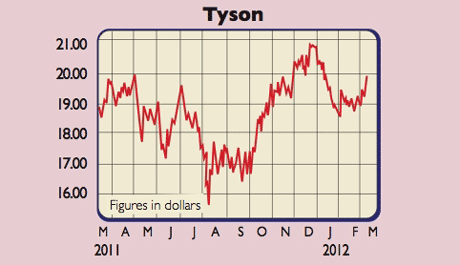Get the latest financial news, insights and expert analysis from our award-winning MoneyWeek team, to help you understand what really matters when it comes to your finances.
You are now subscribed
Your newsletter sign-up was successful
Want to add more newsletters?

Twice daily
MoneyWeek
Get the latest financial news, insights and expert analysis from our award-winning MoneyWeek team, to help you understand what really matters when it comes to your finances.

Four times a week
Look After My Bills
Sign up to our free money-saving newsletter, filled with the latest news and expert advice to help you find the best tips and deals for managing your bills. Start saving today!
America's largest meat processor, Tyson Foods, has found a clever way of converting the pork lard, chicken fat and beef tallow from its abattoirs into jet fuel.
Its 50-50 joint venture with microcap Syntroleum is already selling 50 million gallons a year of animal-fat-based fuel to power aircraft, warships and freight trains. Key customers include KLM, Finnair, Thomson, Alaska Airlines, the US Navy and freight company Norfolk Southern Corporation.
The firm has also signed a letter of intent to supply United Airlines with 20 million gallons starting from 2014. All this interest is down to the fact that the jet fuel produces 74% less soot than traditional kerosene, and the diesel can be used in unmodified engines and has a lower freezing point. So it is ideal for colder climates and underground mining, where air pollution is a major concern.
MoneyWeek
Subscribe to MoneyWeek today and get your first six magazine issues absolutely FREE

Sign up to Money Morning
Don't miss the latest investment and personal finances news, market analysis, plus money-saving tips with our free twice-daily newsletter
Don't miss the latest investment and personal finances news, market analysis, plus money-saving tips with our free twice-daily newsletter
After resolving a few teething problems, its flagship factory in Louisiana will soon be running at its full capacity of 75 million gallons (or 4,900 barrels) a day. So rather than paying someone to dispose of its mountains of by-product, Tyson's joint venture could soon be raising cash profits of about $1 for each gallon processed. There's enough animal fat produced across America to repeat the exercise at least another ten times.
But here's the key for investors very little of this upside is priced into Tyson's shares. This is because its usual activity of supplying packaged meat to supermarkets and the catering trade is under pressure from rising raw material costs (eg, for corn) and a decline in US beef consumption due to the recession. Overseas sales are nonetheless strong, with consumption per head in China nearly tripling since 1980. Globally, meat intake has risen 450% in 50 years.
Tyson Foods (NYSE: TSN), rated a BUY by JP Morgan

Wall Street is forecasting 2012 turnover and adjusted earnings per share (EPS) of $34.5bn and $2.01 respectively, rising to $35.5bn and $2.32 for the year ending September 2013. I value the group on a through-cycle earnings before interest, tax and amortisation (EBITA) multiple of seven.
After adjusting for $1.4bn of net debt and assuming sustainable operating profit margins of 5%, that suggests an intrinsic worth of $28 a share.
Tyson is exposed to natural disasters, input cost inflation, competition, food scares and trade wars (with China, for example). But the stock is cheap, and the joint venture, if successful, could be the catalyst for a well-deserved re-rating. The next quarterly results are scheduled for 7 May. JPMorgan has a target price of $27.
Rating: BUY at $19
Paul Hill also writes a weekly share-tipping newsletter. See www.moneyweek.com/PGI or phone 020-7633 3634.
Get the latest financial news, insights and expert analysis from our award-winning MoneyWeek team, to help you understand what really matters when it comes to your finances.
Paul gained a degree in electrical engineering and went on to qualify as a chartered management accountant. He has extensive corporate finance and investment experience and is a member of the Securities Institute.
Over the past 16 years Paul has held top-level financial management and M&A roles for blue-chip companies such as O2, GKN and Unilever. He is now director of his own capital investment and consultancy firm, PMH Capital Limited.
Paul is an expert at analysing companies in new, fast-growing markets, and is an extremely shrewd stock-picker.
-
 Should you buy an active ETF?
Should you buy an active ETF?ETFs are often mischaracterised as passive products, but they can be a convenient way to add active management to your portfolio
-
 Power up your pension before 5 April – easy ways to save before the tax year end
Power up your pension before 5 April – easy ways to save before the tax year endWith the end of the tax year looming, pension savers currently have a window to review and maximise what’s going into their retirement funds – we look at how